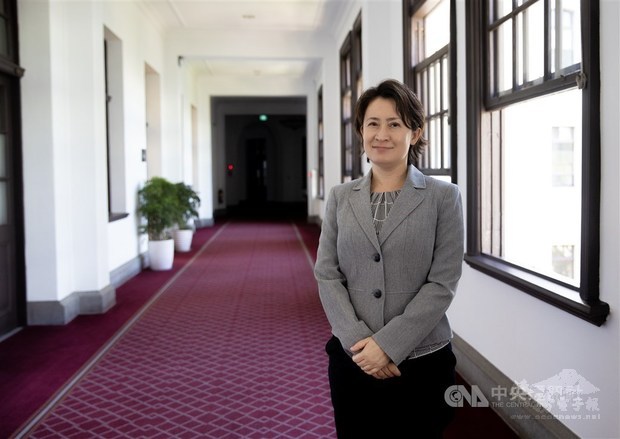
Taipei, July 11 (CNA) Hsiao Bi-khim, Taiwan's representative-designate to the United States, has vowed to develop a trust-based partnership with the U.S. on many fronts, especially in the area of technology security.
The former legislator and National Security Council advisor was appointed as Taiwan's de facto ambassador to the U.S. in June and will become the first woman to hold the position when she takes it over by the end of this month.
"I lived in the U.S. for 10 years, went to high school and graduate school and then found a job in Washington D.C. I feel like God wants me to serve as a bridge between Taiwan and the U.S.," she told CNA in an exclusive interview.
"Aside from that, I've been in close contact with the U.S. over the past three decades due to the nature of my work," she said.
Hsiao said she intends to push for wide-ranging cooperation with the U.S. in such areas as national security, agriculture, trade, industrial restructuring, and technology security, with technology likely a priority.
Competition between the U.S. and China has shifted from geopolitics to technology in recent years, and many believe Beijing's rapid technology advances are partly due to its theft of trade secrets from the U.S., she said.
China's spying activities in technology have alarmed the industry, she said, and therefore opening more doors for Taiwan to strengthen technology cooperation with the U.S. becomes important.
As a manufacturing hub of information and communication technology products, Taiwan needs to ensure that it is a trustworthy partner of the U.S., she argued.
Another important challenge will be promoting Taiwan's soft power through sports diplomacy, food diplomacy and other cultural activities, Hsiao said.
One of her plans to achieve that goal is to hold exhibitions showcasing Taiwanese culture and art at Twin Oaks, an 18-acre estate located in Washington, D.C. that is owned by Taiwan's government and used for official functions.
Although she is not a career foreign service officer, Hsiao felt she possesses the personality traits, especially being creative and impartial, needed for her new job.
"Since I am not from the foreign service system, I can treat everyone from different government branches equally. My efforts to advance Taiwan-U.S. relations will not be one that is limited to diplomatic aspects," she said.
Another asset, Hsiao said, is that she knows President Tsai Ing-wen's views and the outlook of the nation's security team on many issues very well.
Regarding Taiwan-U.S. relations, Hsiao said a free and open Pacific, the core value of the U.S.'s Indo-Pacific Strategy, is aligned with Taiwan's national interests, especially as China expands its influence in the region.
Taiwan will use its limited resources to help maintain regional peace and stability in the region, Hsiao said, and she believed that many like-minded countries would like to work with Taiwan not only on security issues but in other fields, such as Chinese-language learning.
"There are plenty of opportunities for Taiwan to engage in more interactions with other countries," she said.
Several challenges await Hsiao in her new position, however, including China's "Wolf Warrior" diplomacy.
Hsiao, a cat lover, joked that she will cope with China's offensive with "War Cat" diplomacy, as cats are smart, agile and flexible, allowing them to find a way out in difficult situations.
Another challenge is the COVID-19 pandemic, which prevents face-to-face interactions between people, she said.
More "creative ways" are needed to cope with the new normal, Hsiao said.
Hsiao, born to an American mother, has served as the Democratic Progressive Party's chief of international affairs and a consultant to the Mainland Affairs Council, and has participated in various regional organizations, including the Council of Asian Liberals and Democrats.